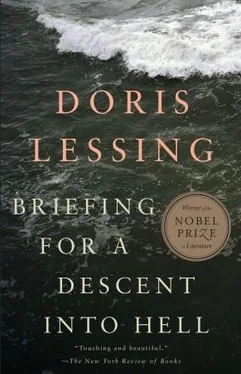We went to a pub nearby, where I telephoned the person who was expecting me, to apologise for not coming. I could not leave Frederick then. He was, in fact, in a very disturbed state. It turned out that during the last few weeks we had had the same experience. In his case he could not remember a definite beginning to it all. He could not say: It all started because one evening I sat in a cold lecture hall listening to an enthusiast about education. No, but one day he realised that he was in a different state or mood. But he couldn’t define that mood. His work which he loves and usually puts before everything — even before his wife and family, as he readily admits — this work had become a routine, something to be done. He thought he might be ill. He even went to the doctor and was given a tonic. He found he was sleeping badly. He described it as the kind of sleep one has before a journey when you have to start very early, and you keep waking yourself up to make sure you don’t over sleep. He was offered a chance to do some work on a site in the Sudan, and though he had been wanting to work in Africa again, he said no. Yet he knew this was foolish, and might be a decision he would later regret.
Finally he said to himself that he was slightly mad, and perhaps this was due to discovering he was indubitably middle-aged! But he stopped caring about the whys and wherefores. He said everything had become heightened and alive, and it was like being in love, that condition when for hours, days, weeks, everything is soaked with the personality of the other person. Yet he was not in love.
And there was no other person. He said it was as if everything — person, place, tree, plant, building — was full of riches, promise, yet each turned away from him as he approached. “It was as if I approached a mirror and found it blank.” I know this feeling well. Do you? I told him of my experiences on “the night of the children” (which is now my label or catch-phrase for it). We stayed talking until the pub closed, and then went to my flat because we both had the same feeling — each to the other was a jar full of possibility, but a closed jar, sealed. But if we talked long enough, some revelation would emerge, some clue.
One trouble was that our lives have been so different, he always travelling, always finding new places and cities, and I have been a teacher and a housewife and mother seldom leaving England. Yet we did have this thing in common, the having been struck by a condition like extra wakefulness. Other people’s responses seemed slow. They seemed half asleep. Yet this condition was also an affliction, for it was a strain and a difficulty — a challenge it was hard to rise to.
I’ve written about that meeting with Frederick in detail, because it was like “the night of the children.” Now I’ll abridge things, and try and make some order.
Frederick and I met nearly every day — we have now reached early summer, end of May, beginning of June. As I said, I’ve retired, and he had left himself at a loose end. He is an energetic man and dislikes idleness. He set himself up for a couple of lectures about the site in Turkey. He has done a lot of lecturing. One evening he came to see me, about ten at night, saying that when he had stood up to start speaking, a couple of hours before, it being the first lecture, he started stammering so badly he could not go on. He literally could not bring the words out. Excuses were made, that he had been overworking and so on. Apologies, much embarrassment. He came to see me, astonished, shocked, and not a little afraid. He had returned to his belief that he might be ill. Yet although he had not been able to bring out two consecutive sentences — had not brought out one word without stammering it — with me he did not stammer at all. He was as usual. Suddenly he remembered that it had happened to him before, about ten years before. But the thing had been so unpleasant he had pushed it out of his mind. He said: “It was such a bizarre thing, when I’m so fluent and talkative that I could not associate it with myself. It really did seem to be happening to someone else.” He had finished a year’s work on a site on a Greek island. He was lecturing on the Iliad and the Odyssey, in connection with certain discoveries he and colleagues had made. He began stammering. He battled on, because it was not something that had ever happened to him, yet after a few minutes a fit of stammering so bad he could not go on attacked him, and he had to end the lecture. It was as if, he said, his tongue had been numbed or frozen.
He went home and there finished aloud the lecture he had intended to give to the audience. He did this perfectly easily, in his normal fluent way. But he noted that as he talked, another stream of words paralleled the stream of words that he was actually using, and this parallel stream expressed opinions not precisely opposite to those he was using, like an echo or mirror image — which, said Frederick, would have made some sort of psychological sense — but opinions rather off at a tangent, and, he said, he could swear they were not opinions he had read, or heard spoken of. They were crazy, dotty, batty, cranky. But he could not prevent that silent stream going on, quite distinctly, while he came out with his ordered and sensible lecture. He said that he felt that if he relaxed a vigilance or censor for one moment, his tongue would begin voicing this other crazy stream, he would be as helpless as a ventriloquist’s dummy.
Well — he cancelled the course of lectures, and went on a holiday with his family. He took sedatives prescribed by his doctor, and when the holiday was over he went off on another dig, and soon he had forgotten completely that he had stammered at all.
I am going into more detail about the stammering than I otherwise would, because on “the night of the children” you said in passing that you had had trouble with stammering.
Frederick cancelled his series of lectures on Turkey. He went to a psychiatrist, who was not able to unearth any private trouble, Frederick insisting that he is happy in his work, his life, his habits, his wife and his children — now grown up. He then told the doctor about his state of mind in the last few weeks, and discovered that he is suffering from the male menopause and manic depression. This he found interesting in an academic way, but unhelpful. It occurred to him that going to the doctor had added another parallel track, “like a railway line” to his life. Discussions with the doctor about his condition went on alongside the condition, without affecting it in any way, or affecting what really interested him — which was, and is, the discussions with me, and with one or two other people. I’ll simply say at this point that shortly after my meeting with Frederick, both of us made other encounters, of the same quality. These meetings were separate, and fortuitous, yet Frederick’s friend and mine knew each other, and had, in fact, the sort of relationship I and Frederick had had for years — the long-running serial story. If you come to meet us, which I do hope this letter will have the effect of achieving, then you will meet me, Frederick, and two others, all of whom had their lives changed in the last few months, yet in ways which are very hard to describe, so slight and imperceptible are these changes to an outer view. Back to Frederick. After half a dozen appointments with the psychiatrist, Frederick was still stammering whenever he approached any aspect of his professional work, and was quite fluent and easy-tongued on any other subject.
The psychiatrist offered Frederick various treatments, all chemical, but Frederick left him and found himself a specialist in stammers, not a doctor, but someone outside the medical profession. This man uses a method which cures stammerers by making them speak very slowly, sounding every letter, with measured pauses between the words. The sounds that come out are emotionless, without the usual flow and movement of speech. It is a machine speech. But the method does cure some people. Frederick did go to half a dozen classes, and then it occurred to him that the method was a way of putting a lock on one’s spontaneity, creativity. The method was a censorship. Watching every syllable as it comes to one’s tongue means more than focussing a total attention on one’s speech — it means putting the censor further back, into one’s mind. Sorting out, or choosing, words when they have already arrived at one’s tongue’s end, that is too late. No, the choice must have been made earlier, in the mind. Frederick found that he was getting very good at it. In class he was sounding like someone who had just learned English and had to work out every sentence before using it. Or like someone living in a dictatorship, who has to keep a guarded tongue. But when he broke into uncontrollable stammering, it was as bad as ever, though less frequent. He left the classes, and decided not to return to the psychiatrist. He had understood that — there must be something that he should be understanding.
Читать дальше
Конец ознакомительного отрывка
Купить книгу










